Text
Access to Policymakers and Influence
This week we touched on the relationship between access to policy makers and influence in the climate world. I think being able to interact directly with influential decision-makers who create and carry out climate change policies is important because you can be able to comprehend their influence and just how much it can help carry out policies in the climate world.. With this access, people and organisations are able to actively influence agendas, tactics, and policies pertaining to climate change. I also think it comes with a skill of being able to offer knowledge, data, and viewpoints to support policy choices, push for bold climate action, and rally support for sustainable projects. Finally, having access to policymakers makes it easier to network and collaborate with representatives of other governmental agencies, foreign agencies, and other interested parties, which in turn promotes the formation of alliances and support that promote the significant change needed in the climate space which could result in other policymakers following suit. Essentially, this interaction pushes urgency to act and address climate change, while allowing for growth and resilience. During the climate negotiations simulation I was able to comprehend a new side of policy negotiations. The simulations gave me a more hands-on approach allowing me to use my theoretical knowledge gained from my different courses and apply them to ‘real world’ scenarios. I was able to get a greater understanding of the dynamics of international relations, the value of good communication, and subtleties of negotiating strategies.
0 notes
Text
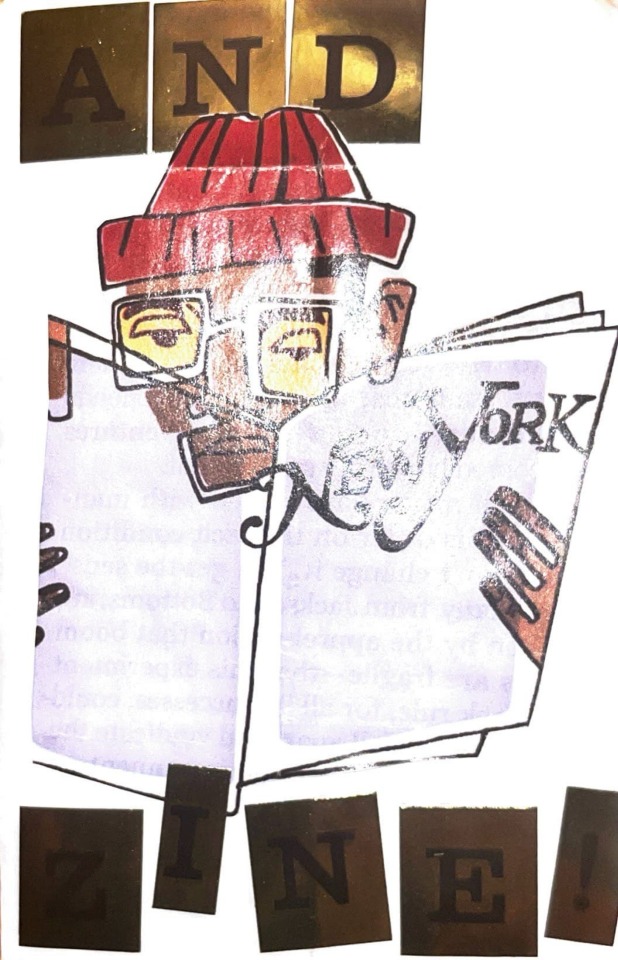
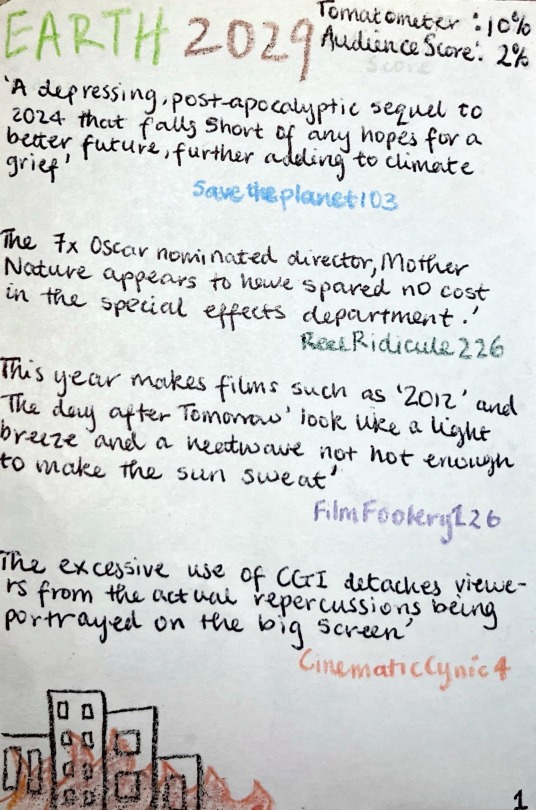
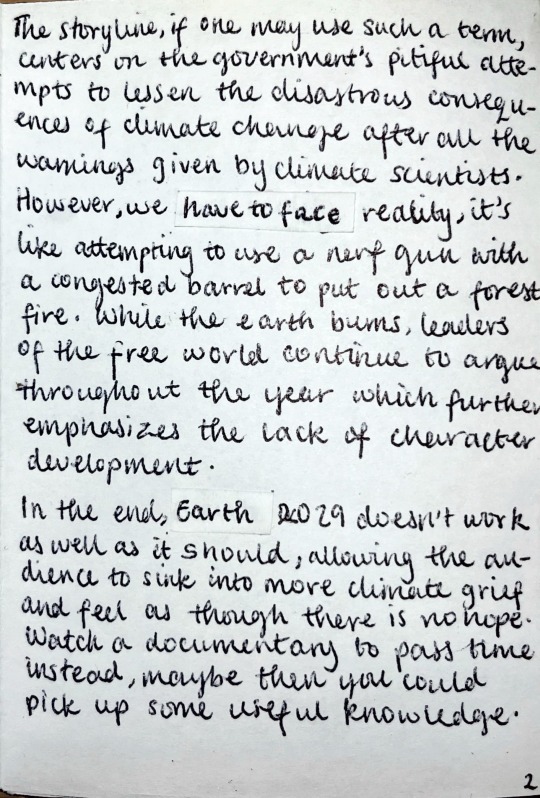
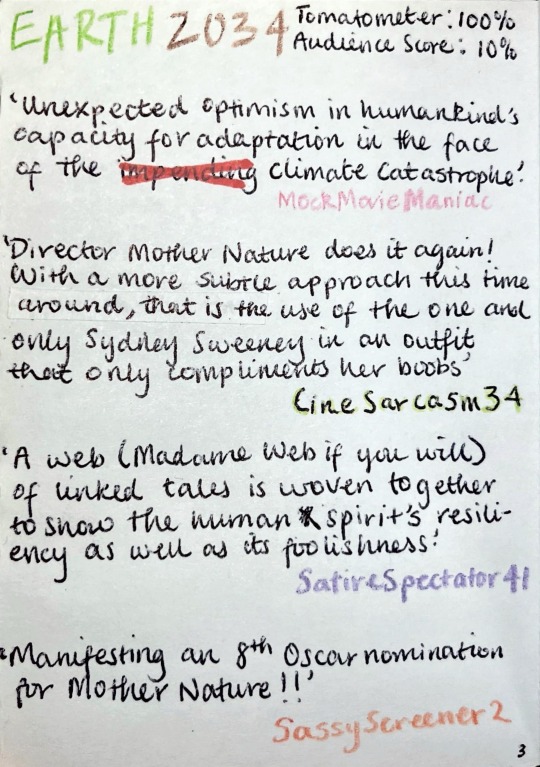
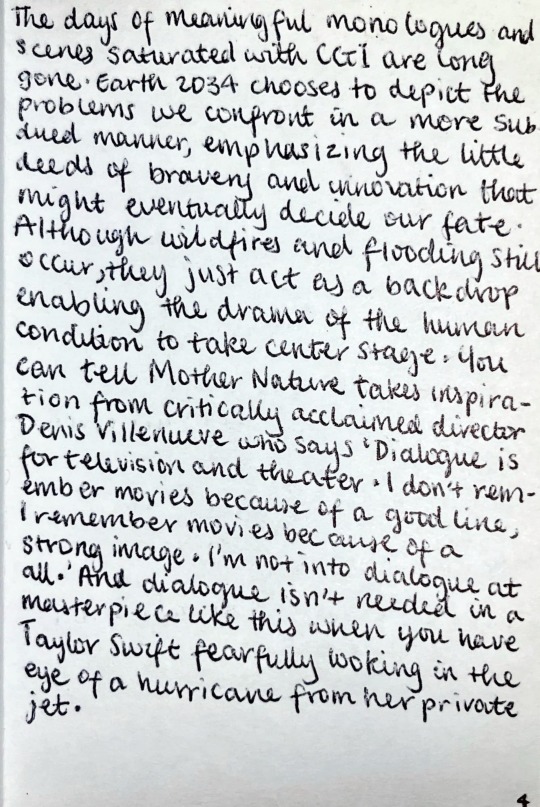
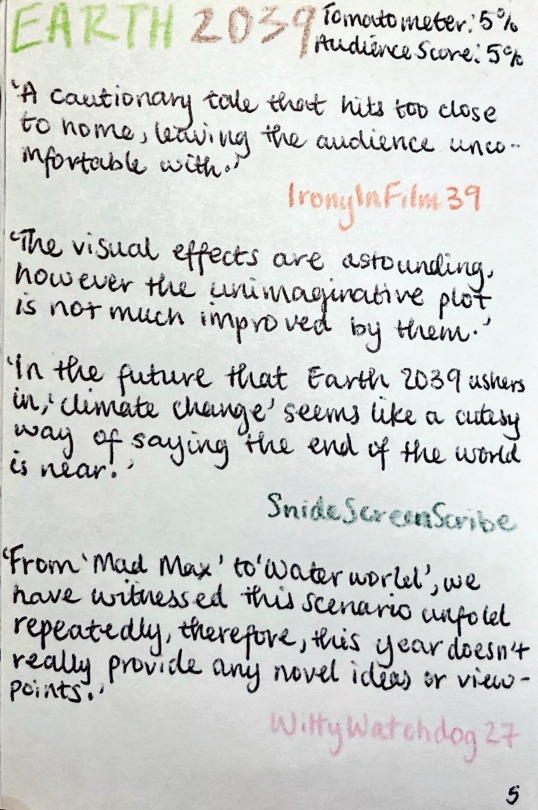
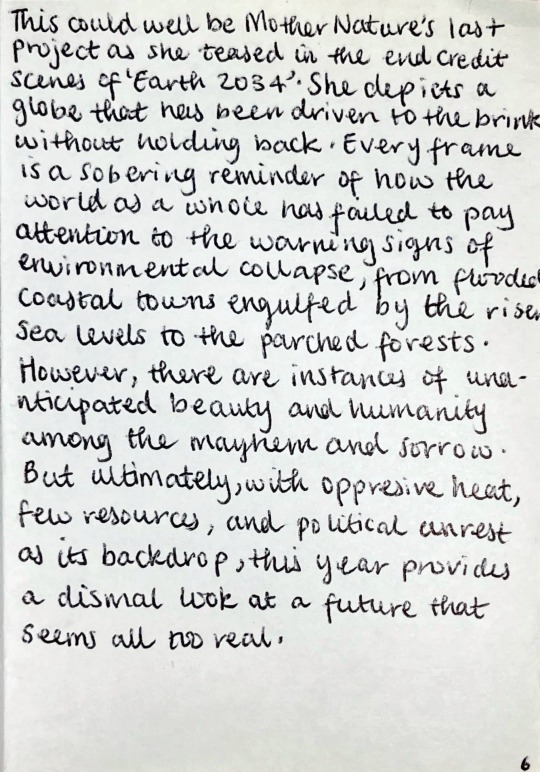

I decided to make a zine and relate it to what I want to do in the future regarding climate storytelling. The prompt was 'What will climate look like in the year 2040', so I decided to do satirical 'film reviews' for every 5 years up until 2040. Satirical because i think comedy has a place in climate storytelling were it forces people to talk about it because using something as simple as comedy can help drive conversations about climate change. Sources used: https://www.rottentomatoes.com/
0 notes
Text
Bridging the Green Gap
Financing in the climate space is an important part of getting all types of professions involved in climate action. However, the majority of the time with corporate involvement in the climate space can sometimes involve greenwashing, and this is where companies start to lose transparency in their goals for climate action. In terms of my future and collaborating with companies, I would want to scope out the company and make sure their goals align with mine especially when creating something so impactful like climate storytelling. I say this because stories have a powerful and also detrimental impact, so when a company is able to finance the production of a story it's important to ensure that they advertise it in its true and honest form.
0 notes
Text
Climate Storytelling
It’s a scary feeling not knowing what is going on in a place you call home. After weeks of the raining season in Nigeria, my car flooded on my way to school. This experience significantly impacted my view on the potential impact of climate change on my personal life and the environment at such a young age. I don’t think I was aware of the word climate change at this point in my life, therefore I wasn’t able to put too much thought to it just because it’s not a word that’s said often. I can’t really describe how I felt in the moment because it was a long time ago all I can remember was being scared and feeling strange. I sort of brushed off what had happened, looking back at it now, it’s possible it was a canon event which led me to pursue work in climate. When I think back to the situation, there is this eerie feeling I get just thinking of how I paid no attention to the situation because it was the raining season in Nigeria, not knowing it was one of the worst ones that had happened. And this nonchalant behaviour to the weather happens almost all the time in the continent of Africa because we’re told ‘That’s the weather’. Sure, that’s the weather but it’s been intensified through climate change and the worst part is the people in Africa aren’t the perpetrators, yet they receive the heaviest impacts of it all. It’s a scary feeling not knowing what is going on in a place you call home.
Being able to share my experience with others not just employers is important to me because perspective is one of the key aspects of storytelling, especially in a climate space. Having multiple stories that have a common ground not only changes views of climate change but it inspires and gives people a voice to help share their stories especially those who suffer first hand from the impacts of climate change.
0 notes
Text
Financing Energy Transition
Financing the energy transition's gap is essential to the world's quest of sustainable energy. Sometimes a gap between investment demands and available funding when countries shift from fossil fuels to renewable energy sources. From the panel, Dr Jain spoke about needing to have creative financial strategies and teamwork to close this gap. For example, energy transition projects are heavily financed by public private partnerships. Partnership between the public and private sectors generates momentum in financing the gap. When conversations like this happen, it's important that people with different perspectives are in these conversations, especially people like Ilona Duverge who spoke on the panel about raising your voice and pushing through the doors that stop those from speaking up.
0 notes
Text
Climate Journalism
This week’s speakers described how they try to find a truthful narrative in the world of climate through journalism. A lot of questions arose especially along the lines of navigating the actual climate in the eyes of the deep south and not just looking at the crisis through the narrow lens of the West. The speakers did an alright job of answering these questions, but the answers weren’t very clear when tackling the issues of truthful narratives. I think the reasons for this could possibly be due to the speakers not wanting to say the wrong things and being misconstrued, however seeing as they were journalist, I would’ve thought by now that they would be able to answer these questions due to their background. Overall, the panel of journalist made me question how and when will we start putting those who are majorly impacted from the climate crisis in charge of the distribution of the news in order to get the truthful narrative and first hand experiences.
0 notes
Text
Navigating Climate Pathways
Every other day I think of what paths I could take with the C&S degree. I'm not sure if that is a very useful way in thinking about my career but it doesn't restrict me! Majority of the time I land on the decision of Climate and science, although in the back of my mind I want to add a creative aspect to my career, such as film and climate storytelling. I found Dr Browne's journey the most relatable and interesting because we have similar backgrounds and he has a passion for combining the engineering side of his career with the climate and environmental side. Throughout my academic career I frequently bounced around trying to see what I wanted to do and how I wanted to apply my work. At the moment I think I have an idea, but that could change and I think that's fine especially seeing how the world, especially the climate world keeps changing and adding new aspects to helping with the climate crisis. Hearing the Alumni panel helped me discover this because it made me realise that everyone starts from somewhere and it's okay to navigate your way through the working field. There will be something there for me and I may not know it now but I will find it.
0 notes
Text
Climate Science & Activism
As a fellow STEM person, I tend to gravitate towards some of the notions mentioned that surround scientists i.e. ‘good scientists can’t be advocates’ purely because I think I find it harder to convey the data gathered in a different format other than a lab report. The key-note speaker spoke about how before the climate crisis was put into play, people mainly came into climate science out of curiosity, but because of how pressing the climate crisis is and how it has worsened over time, more people are getting into the climate science field to help mitigate the crisis. The recent influx of people stepping into the scientific field goes against the belief of ‘scientists can’t advocate for climate policies because that’s not their job’, which emphasises the generational change and perception of climate scientists and this has encouraged me more to be able to put my STEM skills to use and help amplify activism in climate as well as come up with some strategies for starting conversation between older and current scientists and the youth about how productive conversations can happen especially with those who have different perspectives of the climate crisis.
1 note
·
View note